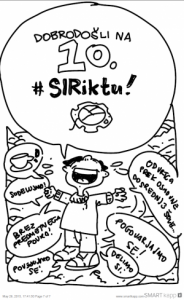Maja Kovačič, Osnovna šola Prežihovega Voranca Jesenice, Jesenice
In addition to print textbooks students and teachers can recently use digital textbooks for the English language: e-textbooks (interactive form of print textbooks) and i-textbooks (interactive textbooks) which promote the usage of ICT both at school and at home. I placed my presentation in theme section titled Creating for Learning as I would like to present the advantages of learning English vocabulary through e- and i-textbooks in practice. Learning vocabulary in this way is easier and quicker, because the meaning of words can be easily checked in an electronic glossary (explanation of words in English and Slovene translation), and there are also flashcards that even simplify memorizing. Interactive exercises (complete the sentences with words in the box, tick the right answer, choose the correct word or phrase to complete the sentences, match parts of the sentences, etc.) allow students to get immediate feedback on their level of knowledge or progress which is useful for creating further learning plans. Students have even the possibility to choose the level of difficulty (easy, medium or hard) with some exercises. The advantage of this type of innovative learning is a critical selection of exercises depending on the students knowledge and their interest, because it is not necessary to solve all the exercises and to solve them in the order given. The main objective of my contribution is to present the possibility of enriching vocabulary during English lessons. Students are usually enthusiastic about this approach and therefore continue doing exercises also at home. In general, students are fond of various forms and methods, and this method of learning is well accepted among them, because it is different and due to the use of technology close to them. However, it can represent a potential trap because students’ attention easily diverts elsewhere (social networks, videos, music, etc.). In the learning process, participants will be familiarized with some of the exercises for enriching English vocabulary by using e- and i-textbooks, other interactive exercises that are available on the World Wide Web, as well as some applications that allow creating individual props for learning English (e.g. flashcards, crossword puzzles, writing short stories, etc.). Participants will be actively involved in the implementation of activities (individual work, work in pairs or groups) and at the end they will be asked for feedback (pros and cons of using digital textbooks in comparison with using print textbooks for learning English vocabulary).
